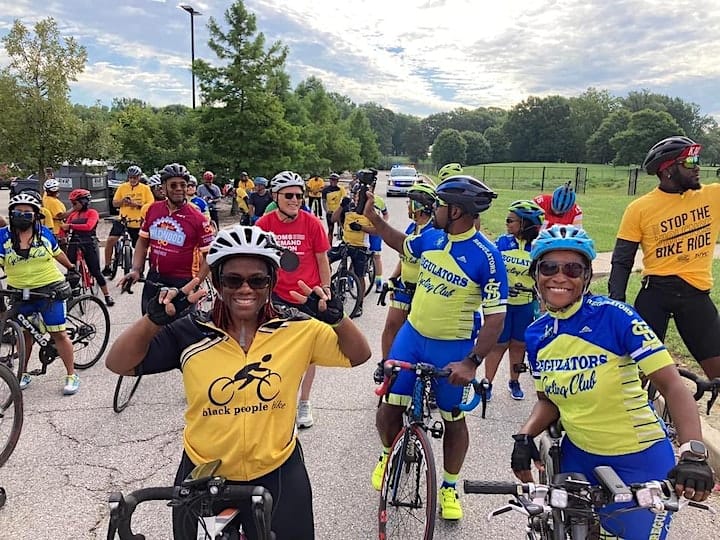In 2007, north St. Louis resident Shawn Walker was watching a music video featuring Snoop Dog on a lowrider bike and saw a way to cool his desire for revenge. His older brother, Charles, had been killed in a home invasion about six months earlier.
“I was just engaged in activity that was going to send me either to the graveyard or to the penitentiary,” Walker recalled.
But he also had carpentry skills and decided that he could build bikes like the ones he’d seen in hip-hop videos. That realization allowed Walker to leave his anger behind and launch a business, Candy Shop Custom Bikes.
“I grew a passion for lowrider bicycles, but it came from the demise of my big brother,” said Walker, who is now 47 years old.
These days, Walker thinks that bicycles can help other people peddle away from gang culture. In late July, he organized the second annual Stop the Violence Bike Ride in north St. Louis. Participants were scheduled to ride through an area with a high rate of poverty and gun violence.
Walker hopes that by sitting atop a saddle, riders would gain a new perspective on their surroundings.
“Our community needs to know who we are,” Walker said. “We’re down-to-earth people. We’re good people. We’re positive, and we love our neighborhood, and our neighborhood needs healing.”
Getting Low
According to MotorTrend, the lowrider bicycle movement started in the 1960s, when George Barris, a custom car builder, decided to construct a bike inspired by cars that had a lowered body.
Manny Silva, the “Godfather” of lowrider bikes, started to build his creations in Compton, California, and they become part of Mexican American culture. Then, West Coast rappers like Snoop Dog hopped on the bikes.
When Walker started to build lowriders in 2007, he tried “candy painting” them.
This meant applying layers of paint, such as a blue transparent shade or a green transparent shade, so that the bikes changed colors in the light.
“We just fell in love with that. That’s how we became the Candy Shop,” Walker said.

Shawn Walker of Candy Shop Custom Bikes.
After building the bikes for years at automotive shops, Walker finally purchased his own building in Walnut Park and plans to open in early 2024. He hopes it will help transform the surrounding neighborhood.
Walker, who has three daughters and a son, sees a community that has been overwhelmed by the opioid epidemic, where “violence is so common. It’s like you have been almost desensitized to a drive-by shooting or murder,” he said.
St. Louis City continues to have one of the highest murder rates in the country. By early July, 87 people had been killed, according to the St. Louis Police Department. If that rate were to continue for the remainder of the year, it would mark a slight decrease from recent years.
In the O’Fallon neighborhood where the Stop the Violence Bike Ride takes place, a 15-year-old boy was shot and killed in April and a 24-year-old and 31-year-old were killed in shootings in May.
Ride On
About 130 people participated in the Stop the Violence Bike Ride in 2022, and Walker hoped to have twice that number this year. (Editor’s note: Unfortunately, we had to go to press before the 2023 event took place.)
Danita Gibson planned to ride again. She grew up in Walnut Park in north St. Louis, where her mother still lives. Gibson, 44, a mother of four, started to have children as a teenager and raised them on her own.
“It was a struggle in the beginning, but you know, life is good. God is good,” said Gibson, who works as an operations specialist with internet and cable television provider Spectrum. “I was able to overcome all of the obstacles that came along with being a teenage mother.”
She says she kept her children safe by signing them up for sports at Mathews-Dickey Boys & Girls Club.

Stop the Violence Bike Ride 2022.
Gibson hoped the ride would get the attention of city leaders and spur them to provide additional assistance in north St. Louis for drug rehabilitation, neighborhood clean-ups, and affordable housing.
“If you’re living around trash and abandoned buildings and abandoned cars, you don’t feel good,” she said.
The 5-mile bike ride was scheduled to start at the O’Fallon Park Rec Complex YMCA and then head south to Be Well Café Eat & Drink Boutique, a nonprofit farmers market and farm-to-table eatery. The stop would offer fresh produce and hydration for riders.
At the YMCA, organizations such as Trailnet, which promotes nonmotorized transportation and public transit, and Affinia Healthcare, a nonprofit provider, planned to have representatives at the event.
LaDon Meriweather, Affinia’s director of outreach, planned to provide information on the organization’s services, which include mental health counseling, child developmental care, and dental care. He also hoped to help people enroll in Medicaid and do blood pressure readings.
Meriweather thinks Walker, a longtime friend, is an effective organizer because people in the community know him and his story.
“Shawn has always been positive. He has always done something different,” said Meriweather. But he was also “around the people that were a part of the problem, and to become a part of the solution, it is just a blessing.”
As much as Walker believes in the Stop the Violence Bike Ride, he hopes he can one day drop the name.
“I pray to God that one day we will change the narrative for our bike ride,” he said. “Maybe it will be ‘Save the Whales Bike Ride.’”
Author: Eric Berger is a regular contributor to Terrain Magazine.


Leave A Comment